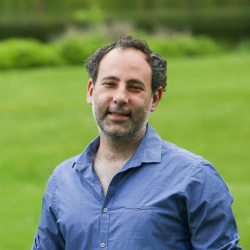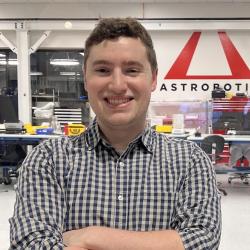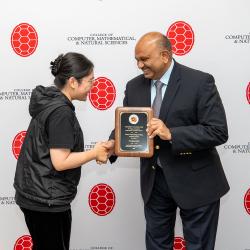Career Q&A with Biological Sciences and Mathematics Alum Safiullah Rifai
Rifai (B.S. ’23) received counsel from the Health Professions Advising Office and will pursue an M.D./Ph.D. at the University of Maryland School of Medicine this fall.

Why did you decide to study both biological sciences and mathematics at the University of Maryland?
I started my journey with math at Montgomery College and realized its importance in machine learning during my first internship at the National Institute of Standards and Technology. Through this internship and my studies, I realized that I was particularly interested in applying machine learning methods to pioneer the sciences. The tools and techniques taught in mathematics are commonly utilized for statistical analysis in biology; however, the modern abstraction of math, machine learning, is only beginning to be harnessed.
When I came to UMD, I intended to pursue mathematics and computer science, hoping to foray into a career in data analysis, software engineering or research. In my third year at UMD, a family friend was diagnosed with cancer, which inspired me to take a deep dive into both biomedical and translational research. Given the increasing importance of multimodal data in medicine, I believe that conducting biomedical research in collaboration with mathematicians and computer scientists will make what is currently impossible, possible.
How did you take advantage of opportunities on campus to pursue your career goals?
I was part of the Integrated Life Sciences (ILS) program in the Honors College and have been closely mentored by [ILS Associate Director] Dr. Sabrina Kramer. I strongly recommend identifying a mentor early on in undergrad. Pro-tip: Make sure this mentor is able/eligible to write a letter of recommendation for whichever graduate school application you will eventually do.
While at UMD, I also volunteered with the Maryland Mentor Corp, a volunteer mentorship program with local elementary school students. Mentoring these students was a privilege; it showed me how much potential every student has. As a program lead, I got to see two layers of development—my peers developing into mentors and our mentees developing into motivated students.
What kind of medical school application guidance and one-on-one feedback did you receive from the Reed-Yorke Health Professions Advising Office (HPAO)?
The HPAO team was very reassuring as I prepared to apply for schools. My time with HPAO advisors helped me understand how my story could fit the culture of a given professional school. HPAO advisors have seen thousands of UMD students go through this process, so their year-by-year accumulation of data, trends, profiles and alumni is a tailored resource for you.
The HPAO team advised me to embrace the entirety of my career trajectory in my application, as opposed to focusing on the tail end that was more related to biomedical research. That crucial bit of advice and reassurance was exactly what I needed just before application season.
[HPAO Director] Wendy Loughlin was so helpful. She told me in advance that my story was an excellent fit for the physician-scientist track at the University of Maryland, Baltimore, particularly because of collaborations between UMD’s Bioengineering Department and other health informatics initiatives. These details were essential for understanding what I envisioned my training would look like over the next few years, and that translated into a confident, well-informed “why M.D./Ph.D.” answer.

What are you most looking forward to about your M.D./Ph.D. program?
I am attending the University of Maryland School of Medicine this fall. I look forward to getting back into the rhythm of school, since I have spent the past two years primarily in the lab at the National Cancer Institute conducting research and implementing bioinformatics pipelines. The change of pace from lab meetings and weeklong experiments to dense medical school lectures is definitely going to be challenging. Nonetheless, I’m most excited about embracing this Schrӧdinger-esque career path to ultimately advance medicine!
What advice do you have for fellow Science Terps who are interested in pursuing medical school?
If you are interested in pursuing an M.D./Ph.D., you should be conducting research in undergrad. You can look into on-campus research opportunities through the Office of Undergraduate Research, and then either cold call faculty members or fill out interest forms on their lab websites. There are also many programs for off-campus research; you just have to keep an eye out for their deadlines, which tend to be in the fall/winter.
If you are applying to medical school or dental school, take some time to look into the application process/structure. Doing this earlier in college will save you a lot of headaches. Planning your activities and consciously building your theme/story as an applicant is the best way to approach graduate school applications. That way, when the question of “why grad school” arises, every activity, experience and letter fits into your story to answer this question. What breaks an application, especially for something as demanding as a dual-degree graduate program, is a haphazard story.
That said, I did not have the opportunity to plan like this. Instead, I took the approach of an unconventional write-up that dug deep into my story and motivations. If you fall into this category, talk to the HPAO team; they can ask the leading questions that will guide your application.
CMNS students have access to advisors and programs tailored to their unique career interests in STEM fields. In this Q&A series, we spotlight how Science Terps capitalize on the resources, support and guidance that CMNS provides.
The Reed-Yorke Health Professions Advising Office uses a holistic, individualized approach to support students in their development as future health care professionals. Current students and alums interested in health professions can access the office’s resources.







